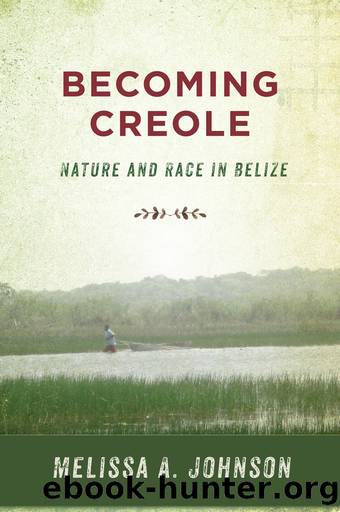Becoming Creole by Melissa A. Johnson

Author:Melissa A. Johnson [Johnson, Melissa A.]
Language: eng
Format: epub
Tags: Social Science, General, Black Studies (Global), History, Latin America, Central America, Science, Life Sciences, Ecology, Caribbean & West Indies, Anthropology, Cultural & Social, Developing & Emerging Countries, Human Geography
ISBN: 9780813597003
Google: BDBSDwAAQBAJ
Publisher: Rutgers University Press
Published: 2018-11-01T05:25:14+00:00
CHAPTER 6
Wildlife Conservation, Nature Tourism, and Creole Becomings
In June 2016, a YouTube video was posted on Facebook by a dear friend from Crooked Tree who now lives in Chicago. It was a Belize news report from the day before. Crooked Tree fishermen were stopped from hauling their fishing nets close to the causeway into the village, even though they thought hauling there was legal. Earlier in the day, I had heard something might have happened after my father-in-law had asked my husband on the phone if he had heard about the problem with fishing in Crooked Tree, and so I watched with great interest. In the video, the reporter, a large dark-skinned Creole man, interviewed a few young Crooked Tree fishermen. A range of other people, men, women, and children milled about in the background, including the typical mix of skin colors and embodiments of this place. Farther in the background were police officers, a sanctuary warden and other government representatives in their official attire, leaning on a well-kept shiny new pickup truck. A young dark-brownâskinned fisherman told the reporter:
This affect we big time because we as a ghetto youth, this dah fi we living weh we do from tradition; this dah pa, ma, everybody di do this. And I noh know weh di go on with dehn bally dehn. But Audubon dah somebody weh we need fi take out yah because dehn di try stop fi we livity. And if dehn di try stop fi we livity, weh dehn want we do? Dehn want we go bruk ina people house? ⦠When we go look fi wah job, first thing yo hear is that we dah criminal with the way how we look; di try class we bad. (Channel 5 Belize Newsâtheir orthography of Belize Kriol)
(This affects us big time, because, us, as poor black youth, this is our living, what we do from tradition, this is father, mother, everyone was doing this. And I donât know what is going on with those guys [the police/wardens]. But Audubon is somebody that we need to take out of here because they are trying to stop our livity [livelihood, way of life, with essence of Jah, living in love and nature, full being-ness]. And if they try to stop our livity, then what do they want us to do? Do they want us to go break into peopleâs houses? ⦠When we go look for a job, the first thing you hear is that we are criminals with the way we look, they try to cast us as very low class.)
This fisherman expresses his rural Creole engagement with the more than human, his âlivityâ and the efforts of conservationists to limit that engagement.1 He also smartly notes how people from rural areas are seen by city dwellers, a point that resonated powerfully with my husband as we watched the video together. The film then cuts to the office of the Belize Audubon Society in Belize City and its directorâa light-skinned Mestizo woman in tidy office attire.
Download
This site does not store any files on its server. We only index and link to content provided by other sites. Please contact the content providers to delete copyright contents if any and email us, we'll remove relevant links or contents immediately.
| Belize | Costa Rica |
| El Salvador | Guatemala |
| Honduras | Nicaragua |
| Panama |
Cat's cradle by Kurt Vonnegut(15341)
Pimp by Iceberg Slim(14492)
4 3 2 1: A Novel by Paul Auster(12381)
Underground: A Human History of the Worlds Beneath Our Feet by Will Hunt(12093)
The Radium Girls by Kate Moore(12021)
Wiseguy by Nicholas Pileggi(5773)
The Fire Next Time by James Baldwin(5433)
Perfect Rhythm by Jae(5400)
American History Stories, Volume III (Yesterday's Classics) by Pratt Mara L(5302)
Paper Towns by Green John(5182)
Pale Blue Dot by Carl Sagan(5001)
A Higher Loyalty: Truth, Lies, and Leadership by James Comey(4955)
The Mayflower and the Pilgrims' New World by Nathaniel Philbrick(4497)
The Doomsday Machine by Daniel Ellsberg(4486)
Killers of the Flower Moon: The Osage Murders and the Birth of the FBI by David Grann(4445)
The Sympathizer by Viet Thanh Nguyen(4386)
Too Much and Not the Mood by Durga Chew-Bose(4341)
The Borden Murders by Sarah Miller(4316)
Sticky Fingers by Joe Hagan(4190)
